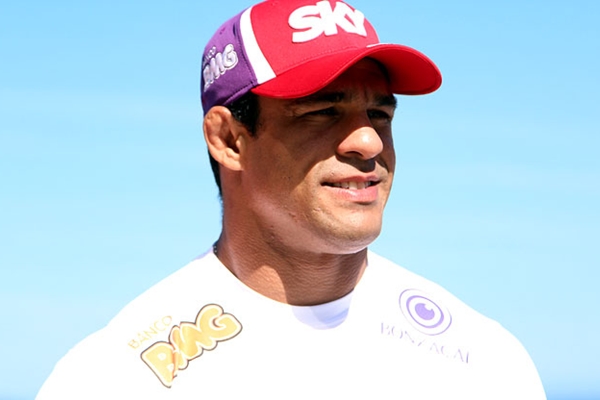Viewpoint: A Needed Scapegoat

Vitor Belfort was replaced in the UFC 173 main event. | Photo:
Gleidson Venga/Sherdog.com
Considering the chain of events that preceded it, Vitor Belfort’s decision to withdraw from his May 24 middleweight title shot against Chris Weidman late last week had to be about the least surprising major announcement in Ultimate Fighting Championship history.
By the time the news -- which was buried on a late-night edition of Fox Sports Live -- broke that Lyoto Machida would take Belfort’s place at UFC 173 in Las Vegas, most of the MMA community had already called it.
Advertisement
It was no coincidence that shortly thereafter the Nevada Athletic Commission voted unanimously to ban TRT use, or that the UFC swiftly followed suit for international events under the promotion’s jurisdiction. Later, the Brazilian commission announced it would stop issuing TUEs following UFC Fight Night 39.
Even Chael
Sonnen, a known TRT user, chimed in supporting the ruling.
“The rules are the rules -- that’s it,” he said on Fox Sports Live. “Yesterday, it was legal, so quit complaining. Today it’s illegal. That’s it. Quit complaining. End of conversation. Testosterone’s out.”
If only that were truly it.
Every high-profile performance-enhancing drug scandal in professional sports needs a scapegoat, and Belfort is that guy in MMA. For those wondering why the likes of Sonnen, Frank Mir, Dan Henderson or others have not received the scrutiny Belfort has in recent months, consider this: “The Phenom” was 2013’s most successful beneficiary by far. At 36 years old, Belfort reinvented himself as a head-kicking virtuoso with knockouts of Michael Bisping, Luke Rockhold and Henderson. He did it all while fighting exclusively in Brazil and receiving TRT.
In baseball, Barry Bonds was reviled during his joyless march past Hank Aaron’s home run record but not because of his race, attitude or any other intangible characteristic. No, Bonds received the scrutiny he did because he was the highest-profile player in baseball suspected of using performance-enhancing drugs. When you have someone on the verge of taking down one of the game’s most hallowed records, it makes no sense to focus on a minor league pitcher who suspiciously added 10 miles per hour to his fastball.
In theory, the toppling of the largest domino will serve to set everything else in motion. Belfort was one step away from capturing the UFC middleweight strap and had arguably become the Octagon’s No. 1 must-see attraction. UFC President Dana White and the company he represents were more than happy to put the ball in the court of the various state athletic commissions when it came to regulating TRT use.
The Belfort-Weidman matchup had the potential to generate a lot of money for the promotion as part of its traditional Memorial Day Weekend card. If the Brazilian was artificially enhanced because the commission failed to take action against TRT, well, that probably was not going to affect gate or pay-per-view revenue.
While chicks dug the long ball during baseball’s tainted renaissance, jaw-dropping knockouts never go out of style in MMA. TRT was a fountain of youth that allowed the UFC to extend the shelf-life of some of its most marketable stars, and it could do so while claiming that everything was legal as long as the athletes stayed within the allowable limits.
Not everyone receiving the treatment was able to operate on the same lofty plain as Belfort, but who is to say that any of them would have even remained relevant without TRT?
When the Association of Ringside Physicians released a statement in late January advocating the “general elimination” of therapeutic exemptions for TRT, it was a major step in the right direction. The ESPN piece seemed to accelerate the process. However, nothing might have happened as quickly had Belfort not agreed to take a random drug test on Feb. 7.
When Belfort exited the title fight the same day the NAC voted unanimously to ban TRT, he claimed that he needed time to adjust to the commission’s new regulations and be able to compete without TRT. Depending on which prepared statement you believe, he was either forced out or dropped out the Weidman fight.
Either way, since he had not yet applied for a license to fight on May 24, the results of that random drug test will not be revealed. Belfort’s lawyer even went so far as to tell MMAJunkie.com that said results were “not relevant.”
Now, if someone who had received as much criticism as Belfort had in recent months had passed a drug test with flying colors, it would seem that those results would be very relevant. Proving himself to be clean would raise a big middle finger to anyone who had doubted him. Instead, Belfort, the UFC and the NAC have basically gone silent. Suddenly the promotion and the commission’s decision to ban TRT seems like a smoke screen, a collaborative public relations move meant to distract the masses.
If you believe banning TRT cleans up the sport, then Quinton Jackson and Muhammed Lawal have a bitter feud they would like to sell you on pay-per-view. Removing TRT is but a small step, albeit a positive one. Now, at least the UFC is no longer advocating what basically amounts to blatant steroid use.
It has been written many times in the past few days, but MMA needs so much more: random out-of-competition testing, blood testing, carbon isotope ratio testing. Without these things, cheaters will continue to cheat. Only the most careless will get caught. Of course, all of this costs money, money that athletic commissions probably do not have. Banning TRT was a low-cost, feel-good measure.
Until more steps are taken, last week’s landmark ruling amounts to little more than a fancy bit of window dressing.
Related Articles







